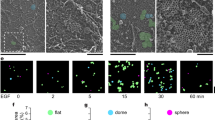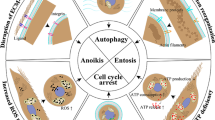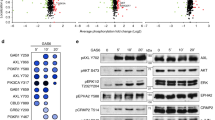Abstract
Most normal cells require both mitogens and integrin-mediated attachment for growth. It is generally accepted that the p42/p44 MAP kinase module, which can be activated by both growth factors and adhesion, plays a critical role in G0 to S phase progression of quiescent cells. Studies on various cultured fibroblasts have shown that removal of anchorage leads to cell cycle arrest in G1 and it has been proposed that adhesion-dependent G1 progression requires the joint regulation of p42/p44 MAP kinase by integrins and growth factors. In quiescent CCL39 lung fibroblasts, MAP kinase activation in response to serum becomes compromised when cells are placed in suspension. Under these conditions, serum-stimulated cells arrest their growth in mid-G1 with reduced cyclin D1 expression and increased p21Cip/Waf1 expression, as compared to their attached counterparts. To determine whether a casual link exists between sub-optimal activation of MAP kinase in non-adherent cells and the observed G1 block, we used a variant of CCL39 stably expressing an estrogen-inducible activated-Raf-1 construct (ΔRaf-1:ER). We found that even strong and sustained activation of MAP kinase with estradiol, in addition to serum, is not able to boost cyclin D1 expression levels or stimulate hyperphosphorylation of pRb in suspended CCL39-ΔRaf-1:ER cells. These results indicate that p42/p44 MAP kinase activation is not a limiting factor for G1 to S phase transit in absence of anchorage. Thus, at least one adhesion-mediated signalling event, distinct from MAP kinase activation is required for maximal cyclin D1 induction and hyperphosphorylation of pRb.
This is a preview of subscription content, access via your institution
Access options
Subscribe to this journal
Receive 50 print issues and online access
$259.00 per year
only $5.18 per issue
Buy this article
- Purchase on Springer Link
- Instant access to full article PDF
Prices may be subject to local taxes which are calculated during checkout
Similar content being viewed by others
Author information
Authors and Affiliations
Rights and permissions
About this article
Cite this article
Le Gall, M., Grall, D., Chambard, JC. et al. An anchorage-dependent signal distinct from p42/44 MAP kinase activation is required for cell cycle progression. Oncogene 17, 1271–1277 (1998). https://doi.org/10.1038/sj.onc.1202057
Received:
Revised:
Accepted:
Published:
Issue Date:
DOI: https://doi.org/10.1038/sj.onc.1202057
Keywords
This article is cited by
-
Adhesion control of cyclin D1 and p27Kip1 levels is deregulated in melanoma cells through BRAF-MEK-ERK signaling
Oncogene (2005)
-
Integrin-dependent signal transduction regulating cyclin D1 expression and G1 phase cell cycle progression
Cancer and Metastasis Reviews (2005)
-
Galectin-3 enhances cyclin D1 promoter activity through SP1 and a cAMP-responsive element in human breast epithelial cells
Oncogene (2002)
-
Bcl-2 induces cyclin D1 promoter activity in human breast epithelial cells independent of cell anchorage
Cell Death & Differentiation (2001)
-
The structural and mechanical complexity of cell-growth control
Nature Cell Biology (1999)



